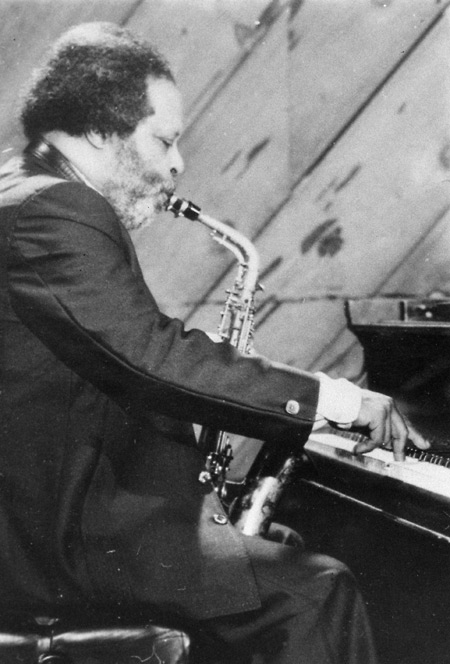Jaki Byard is a musician who has transcended all generations of Jazz. Jaki Byard was the son of John Arthur Byard, Jr., who was born in Worcester, Massachusetts, on June 15, 1922. His father, John Arthur Byard Jr., was a member the marching hands at turn of 20th century. He played the trombone. His mother was a pianist for the African Methodist Episcopalian Zion Church. His maternal grandmother was a pianist for silent picture shows, which were visual movies that didn’t have sound before the invention of “talking movies”. Jaki’s musical journey began on that piano. Grace Johnson, his piano teacher, started teaching Jaki piano lessons at age 8. Jaki was inspired by the swing music and the appeal of big bands throughout his entire career. He played his first professional gig at the age of 16. Jaki was drafted to the army during WW II. However, luck and circumstance allowed him to join the army with Earl Bostic with whom he would form a musical alliance. Jaki was in his late thirties when he signed a recording contract with Prestige Records. This allowed him to participate in numerous recording sessions, allowing him the freedom of having his own compositions recorded. He also performed with Charles Mingus at this time as part of an ensemble which featured many great musicians such as Jack De Johnette and Johnny Coles. They toured Europe, making some amazing sounds and creating history. He enjoyed great success in the 1960’s and his albums were rated with a majority of 3-4 stars by DownBeat magazine. He was awarded the Down Beat Jazz Poll Award in 1966 for being the most promising musician that year. His 21-piece big band The Apollo Stompers, a 21-piece ensemble, was voted New York’s Best House Band. They were playing at Ali’s Alley in Manhattan. Jaki won numerous awards and citations from major academic institutions for his music, teaching and dancing. As he said, “academia” was something he believed in. Jaki’s most cherished moment was when Mercer, Duke Ellington’s son, asked him to fill in for Duke during his illness. The Duke Ellington Society presented him with an award for his performances. He was also awarded the Dr. Martin Luther King Jr. Award by the Mayor of Boston for his outstanding contribution to black music and presence in Boston in February 1988. He holds the key to Worcester, New Orleans and many hearts. Rudolph Guliani presented him with an award in 1995 for his work with Apollo Stompers to celebrate Harlem Week’s 100th anniversary. This was a year after his wife Louise (my mother) died. Jaki was awarded many awards but the one he treasured most was the honor that he was able to write a song for someone he loved, or for a passing thought or idea. This love was what he transmitted through his performances, which were filled with humor and wit. In the sixties and seventies, there was a modest amount of entertainment success. In the mid-70’s, Jaki returned to academia and teaching with occasional recordings. He accepted a position as a teacher at the New England Conservatory of Music, Boston, Massachusetts in the early 1970s. He also taught at The Hartt School of Music and Northeastern University. Bismark State College, The Alma Lewis School of Fine Arts, Boston, The New School, The Brooklyn Conservatory of Music (Flushing), and The Manhattan School of Music. His private students, who would happily travel to Hollis, Queens, for one-on-one lessons, never got enough time. Around 1979-1982 Jaki, along with some other local musicians (among them, percussionist/composer/friend! JR Mitchell, Peck Morrison, Dwight Gassoway (vibraphone keyboard player), Harold Ousley, and Larry Ridley formed the Unification of Concerned Artists to help New York-based musicians who were too far away to get gigs. Things didn’t go as planned for quite a while. But, like most things of this nature, survival is possible and it was worth the effort. I used to transcribe minutes from the Board of Trustees’ monthly meetings. In retrospect, I can see that we did really try to make some openings. It would have been more successful if more time had been spent on his efforts. Jaki’s six-decade-long career was still going strong. He was still recording, and still arranging and composing. He was invited to lead a seminar and play at Boston’s Berkley School of Music, Massachusetts in February 1999. He did not make it to the engagement. Whatever your definition of success may be, Jaki Byard believed that being able to perform his music for the joy of the creativity and fun was the most important thing. Jaki Byard, tragically, died on February 11, 1999. At 76, he was still a gifted musician and artist. His death was tragic, but his life was filled with dreams being fulfilled, great times, and lasting relationships. As his only surviving daughter, five years later, I wish he had fulfilled his last wish to purchase a boat. It was not a huge wish to have. It would be nice to believe that he bought that boat, that our dreams don’t die with us, that maybe he’s just now sailing through heaven listening to the music he loved, playing with his fellow musicians, and enjoying the high seas as only he could. It is rare that a day goes by without me thinking of him. It is almost always with a feeling of gladness that I don’t understand why I think about him so often. Because he was a cheerful, upbeat, and happy person. His inspirations, love, and kindness will always live in my heart. -Diane Byard,http://www.jakibyard.org
